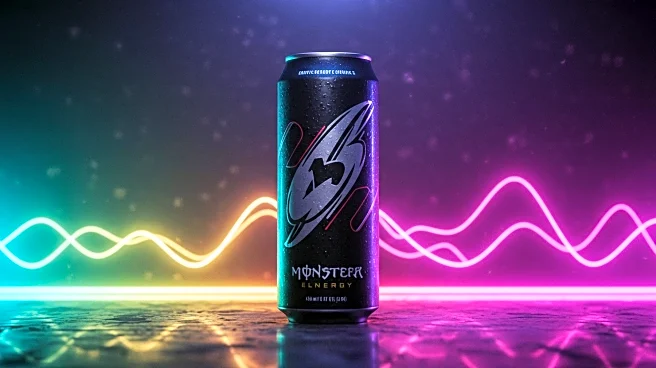What's Happening?
Monster Beverage Corp. has reported significant growth in its energy drink sales during the second quarter of fiscal 2025. According to Hilton Schlosberg, co-chief executive officer, the global energy drink category is experiencing healthy growth, with increased household penetration driven by product functionality and lifestyle positioning. U.S. dollar sales in the energy drink category rose by 13% for the 30-week period ending July 26, compared to the previous year. Monster Beverage's net income for the quarter ended June 30 increased to $488.8 million, up from $425.4 million the previous year, while quarterly sales rose 11% to $2.1 billion. Factors such as high gas prices, inflation, and election uncertainty had previously held back the category in 2024.
Why It's Important?
The growth in energy drink sales reflects a broader trend towards functional beverages that offer specific health benefits and lifestyle appeal. Monster Beverage's success indicates a strong consumer demand for affordable luxury products, even amidst economic challenges like inflation and high gas prices. The company's ability to maintain competitive pricing compared to other ready-to-drink beverages has contributed to its favorable market position. This trend could influence other beverage companies to focus on functional and lifestyle-oriented products to capture similar consumer interest.
What's Next?
Monster Beverage plans to implement selective price adjustments and reduce promotional allowances in the United States during the fourth quarter of 2025. The company is also engaging in discussions with bottlers and customers to optimize its pricing strategy. While current tariffs are expected to have a modest impact on the company's operating results in the third quarter, Monster Beverage remains confident in its business model and production strategy, which involves local manufacturing in respective markets.
Beyond the Headlines
The rise in energy drink consumption may have implications for public health, as these beverages often contain high levels of caffeine and sugar. As consumers increasingly seek functional beverages, there may be a shift towards healthier alternatives that offer similar benefits without the potential health risks associated with traditional energy drinks. This could lead to innovation in the beverage industry, with companies exploring new ingredients and formulations to meet consumer demand for healthier options.









